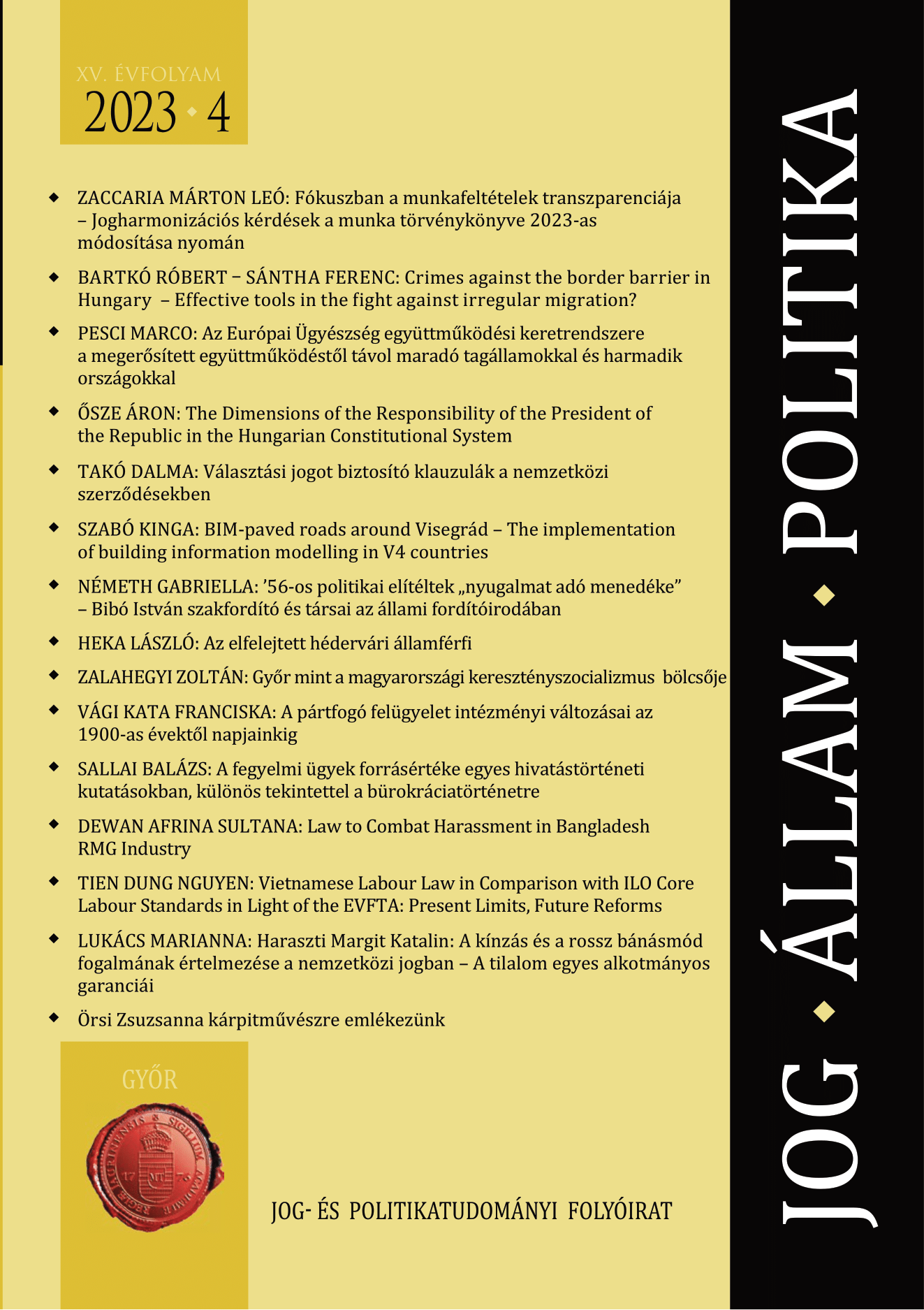Fókuszban a munkafeltételek transzparenciája
Jogharmonizációs kérdések a munka törvénykönyve 2023-as módosítása nyomán
| LETÖLTÉS |
Jog-Állam-Politika, 2023/4.3 |
ZACCARIA MÁRTON LEÓ
ABSTRACT
The present paper focuses on some up-to-date questions of the social policy – in this regard: labour law – of the European Union. To be more precise, the current research is based on the key aspects of the harmonization of laws in this field based on Directive (EU) 2019/1152 on transparent and predictable working conditions. Directive (EU) 2019/1158 on ensuring work-life balance is also mentioned in the paper. The paper analyses the directive from the perspective of harmonization of laws, especially the safeguarding of the workers’ fundamental rights. The examination is focused on some of the most recent developments in Hungarian labour law that resulted in significant amendments to the Hungarian Labour Code. The paper takes into consideration the general legislative context of the new directives, the most fundamental prescriptions guaranteeing the workers’ rights and lawful interests and especially the new regulations regarding the burden of proof in related labour law disputes. The Hungarian examples are focused on these areas of harmonization emphasizing the new regulations of the prohibition of the wrongful exercise of rights. The findings of the research are summarised at the end of the study paying attention to the possible outcomes and concerns of the new labour law regulations.
KEYWORDS
burden of proof * employment relationship * labour law * workers’ rights * working conditions * wrongful exercise of rights
BIBLIOGRAPHY
Aloisi, Antonio (2022): Platform work in Europe: Lessons learned, legal developments and challenges ahead. In: European Labour Law Journal. 13. évf., 1. sz. DOI: https://doi.org/10.1177/20319525211062557
Bankó Zoltán (2020): 10. §. A munkajogviszony létesítése és kezdete. In: Kiss György (szerk.): Munkajog. Dialóg Campus, Budapest.
Bankó Zoltán – Berke Gyula – Kiss György (2017): Kommentár a munka törvénykönyvéhez: kommentár a munka törvénykönyvéről szóló 2012. évi I. törvényhez. Wolters Kluwer, Budapest.
Barnard, Catherine (2020): Are social ‘Rights’ rights? In: European Labour Law Journal. 11. évf., 4. sz.
Barnard, Catherine (2012): EU Employment Law (Fourth Edition). Oxford University Press, Oxford.
Berke Gyula (2003): I. A munkáltató tájékoztatási kötelezettsége a foglalkoztatás feltételeiről. In: Kiss György (szerk.): Az Európai Unió munkajoga. Osiris, Budapest.
Blanke, Thomas (2006): 13. Fair and just working conditions (Article 31). In: Bercusson, Brian (ed.): European Labour Law and the EU Charter of Fundamental Rights. Nomos, Baden-Baden. DOI: https://doi.org/10.5040/9781849468350.ch-034
Boot, Gerrard (2021): Platform work in Europe: The need for a multilevel solution to protect the so-called self-employed. In: European Labour Law Journal. 13. évf., 1. sz. DOI: https://doi.org/10.1177/20319525211063113
Delfino, Massimiliano (2015): The Court and the Charter – A “Consistent” Interpretation of Fundamental Social Rights and Principle. In: European Labour Law Journal. 6. évf., 1. sz. DOI: https://doi.org/10.1177/201395251500600106
Digennaro, Pierluigi (2022): The effects of neoliberalism in European labour law: The meaning of labour and the need for a different constitutional compromise. In: European Labour Law Journal. 13. évf., 2. sz. DOI: https://doi.org/10.1177/20319525221093716
Farkas Lilla (2012): Getting it right the wrong way? The consequences of a summary judgment: the Meister case. In: European Anti-Discrimination Law Review. 15. sz.
Gyulavári Tamás (2016): IV. fejezet – Munkaviszony létesítése. In: Gyulavári Tamás (szerk.): Munkajog (Harmadik, átdolgozott kiadás). ELTE Eötvös Kiadó, Budapest.
Gyulavári Tamás (2014): A szürke állomány. Gazdaságilag függő munkavégzés a munkaviszony és az önfoglalkoztatás határán. Pázmány Press, Budapest.
Hendrickx, Frank (2018): The European Pillar of Social Rights: A first evaluation. In: European Labour Law Journal. 9. évf., 1. sz. DOI: https://doi.org/10.1177/2031952518759987
Hendrickx, Frank (2017): Editorial: The European pillar of social rights – Interesting times ahead. In: European Labour Law Journal. 8. évf., 3. sz.
Horváth István – Petrovics Zoltán (2022): A jogvédelem irányában – Irányelvtervezet a platformmunka körülményeinek javításáról (1. rész). In: Munkajog. 6. évf., 1. sz.
Hungler Sára – Gellérné Lukács Éva – Petrovics Zoltán – Dudás Katalin (2020): Az Európai Unió szociális és munkajoga. ELTE Eötvös Kiadó, Budapest. DOI: https://doi.org/10.47630/kulg/.2020.64.7-8.84
Hungler Sára: Chapter X – Local interests and social integration in Europe: integrating the Member States under the European Pillar of Social Rights? In: Varju Márton (szerk.): Between Compliance and Particularism: Member State Interests and European Union Law. Springer, Cham. DOI: https://doi.org/10.1007/978-3-030-05782-4_12
Hungler Sára (2018): Nemzeti érdekek és szociális integráció az Európai Unióban: az Európai Jogok Szociális Pillérének kísérlete az integrációra. In: Állam- és Jogtudomány. 59. évf., 2. sz.
Jakab Nóra (2022): Minden a feje tetejére áll? – Avagy a munkavégzés és védelem régi-új megközelítése. In: Miskolci Jogi Szemle. 17. évf., 4. sz. DOI: https://doi.org/10.32980/mjsz.2022.4.2111
Kilpatrick, Claire – Muir, Elise – Garben, Sacha (2021): From Austerity Back to Legitimacy? The European Pillar of Social Rights: A Policy Brief. In: EU Law Analysis – Expert insight into EU law developments. 2017. március 20. (Elérhető: http://eulawanalysis.blogspot.com/2017/03/from-austerity-back-to-legitimacy.html. Letöltés ideje: 2023. augusztus 16.).
Kozma Anna – Lőrincz György – Pál Lajos (2020): A Munka Törvénykönyvének magyarázata. HVG-ORAC Lap- és Könyvkiadó Kft, Budapest.
Kun Attila (2016): Az új munka törvénykönyve. In: Jakab András – Gajduschek György (szerk.): A magyar jogrendszer állapota. MTA Társadalomtudományi Kutatóközpont, Jogtudományi Intézet, Budapest.
O’Connor, Niall (2020): ‘Unchartered’ waters: fundamental rights, Brexit and the (re)constitution of the employment law hierarchy of norms. In: European Labour Law Journal. 12. évf., 1. sz. DOI: https://doi.org/10.1177/2031952520911063
Petrovics Zoltán (2021): 15. § A munkajogviszony megszűnése és megszüntetése. In: Kiss György (szerk.): Munkajog. Dialóg Campus, Budapest.
Prugberger Tamás – Tóth Hilda (2020): A munkáltatók munkavállalók irányában fennálló tájékoztatási kötelezettségének várható alakulása az átlátható és kiszámítható munkafeltételekről szóló új irányelv alapján. In: Magyar Jog. 67. évf., 1. sz.
Riesenhuber, Karl (2021): European Employment Law (2nd edition). Intersentia, Cambridge.
Waddington, Lisa – Bell, Mark (2021): The right to request flexible working arrangements under the Work-life Balance Directive – A comparative perspective. In: European Labour Law Journal. 12. évf., 4. sz. DOI: https://doi.org/10.2139/ssrn.3947821

